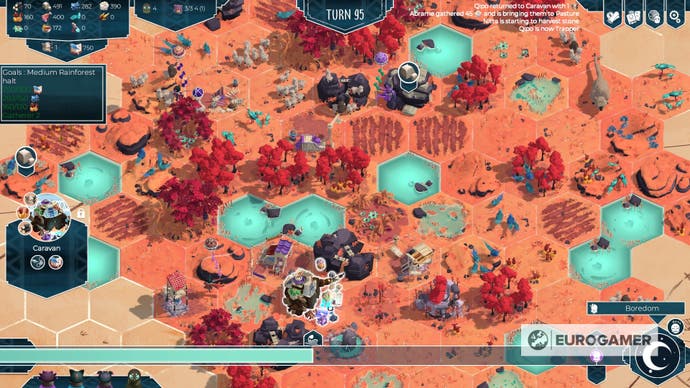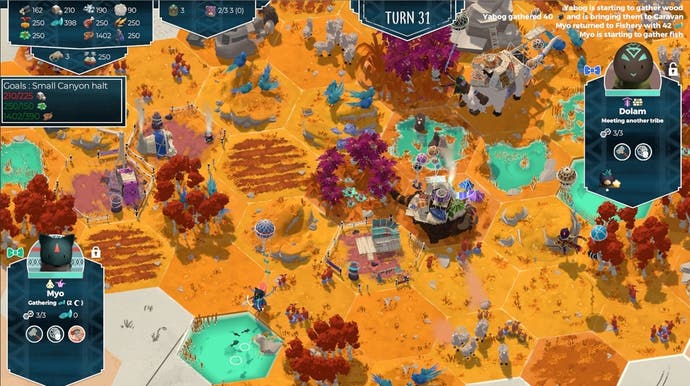As Far As The Eye is a thoughtful, soothing spin on turn-based strategy
Wanderland.
EGX is here! This time it's in the rather unique form of PAX Online x EGX Digital, but we're still covering it like usual.
That means we'll be running a few short articles like this throughout the week, featuring our impressions from some of the most interesting, unique, or just personal favourite games we've tried from the show floor (yes, there's a show floor!).
Last up was Spinch. This time: As Far As The Eye!
Strategy is a staid and somewhat static genre, so it's always a pleasure to see something come along and jumble it up a bit. As Far As The Eye is a strategy game - it's about planting a base and gathering resources - but it's a nomadic one, a Roguelike, and it's largely pacifist, based on flourishing, migration and survival.
In it you manage a caravan, starting with a handful of what the game calls pupils - worker units, basically - that must weave its way across several, branching regions of the map, FTL style, to the Eye. Like FTL, too, time is of the essence, with a flood coming for you after a certain number of turns in each little patch of land.
The twist in As Far As The Eye is the style, which shirks the clanking, industrial overtones of most strategy games for one of floating whimsy. The caravan is a great, mammoth-like beast that groans and sighs, the pupils skippy, wispy little waifs. Resources are stored and carried with balloons, harvested from rocks and quarries and forests - because what would strategy be without those - but sumptuously drawn and coloured ones, all crimson and crystal, in a world more alien than most in that it feels genuinely quite new.
It does push up against tweeness. But, if you'll take my hand for a moment and skip with me to the technical bit over here, you'll find the sincerity needed to back that up. When you arrive in a new area you need to plant the caravan somewhere worthwhile - and fast, given the tide's on its way - and get gathering. What you need to gather depends on where you're going next, your choice of destination having a certain cost, in resources or in "knowledge", another resource earned through the expertise of your pupils.
As one pupil spends time shearing the local wildlife for wool, or tra-la-la-ing their way through another round of deforestation, they'll gain experience in that branch of the skill tree, one bonus being increased knowledge gain each time they drop off a resource, say, or churn out a new product from it. And as they progress through those trees with their own experience, they gain more sophisticated tools and structures themselves, your gatherers turning to cooks, builders to architects, and so on.

There's a trade-off each time you progress to the next crop of land - which, thinking about it now, works as As Far As The Eye's take on an era system, when you layer it over other games like it - which involves a neat little puzzle of fitting your resources, organised into little tetrominoes of wood or meat or stone, into your caravan's grid of storage, and all of it sort of floats back to the sense of early, nomadic life.
You hunt and trap and gather, you move, you greet or trade with others passing by, you take with you what you can, you learn a little, and advance a little, and that's it. A charmed and earthy journey, through a charming world, and through life.










